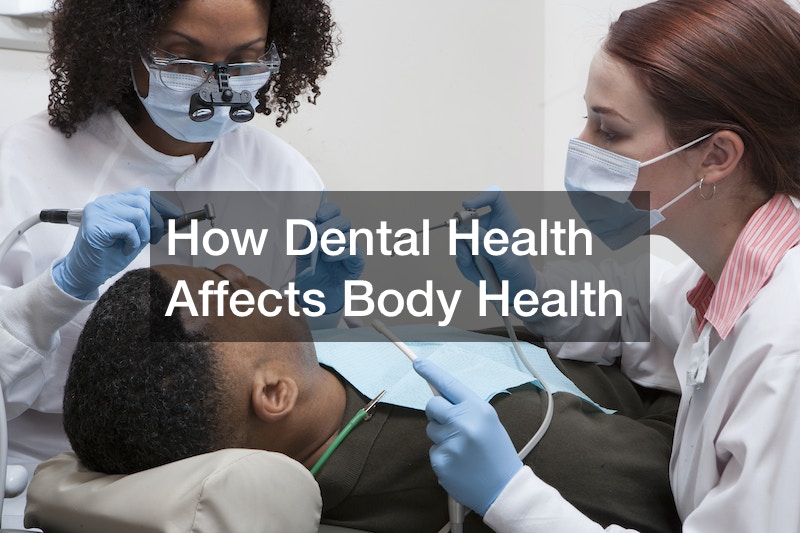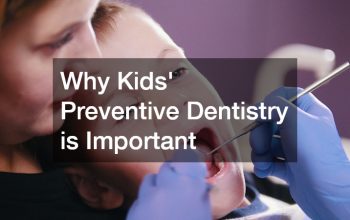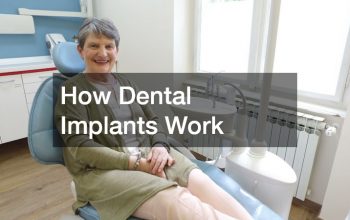


Dental health is often seen as a purely aesthetic concern, but the health of your teeth and gums can have a significant impact on your overall body health. In fact, research has shown that there is a strong connection between your oral health and your overall physical health, with poor dental health being linked to a range of health conditions, including heart disease, diabetes, and even pregnancy complications.
One of the primary ways that poor dental health can affect your body is through the presence of bacteria in your mouth. Your mouth is home to a wide variety of bacteria, both good and bad. The bad bacteria can lead to the development of dental issues such as tooth decay and gum disease. If left untreated, these conditions can lead to the release of bacteria into the bloodstream, which can then travel to other parts of the body and cause a range of health problems. This is just one more way of how dental health affects body health.
One of the most well-known examples of this is the connection between poor dental health and heart disease. Research has shown that people with gum disease are more likely to develop heart disease, and the bacteria from gum disease has been found in the fatty deposits in the arteries of people with heart disease. In addition, people with gum disease are also more likely to have high levels of inflammation in their body, which has been linked to an increased risk of heart disease. This is just one more way of how dental health affects body health.
Another way that poor dental health can affect your wellness is through the development of oral infections. These infections can be caused by bacteria, viruses, or fungi, and they can range from mild (such as a cold sore) to severe (such as an abscessed tooth). Oral infections can be painful and uncomfortable, but they can also spread to other parts of the body if they are not treated promptly. For example, an abscessed tooth can spread to the jaw and cause a dangerous infection, while a viral infection such as herpes can spread to the eyes and cause vision problems. This is just one more way how dental health affects body health.
Poor dental health can also affect your overall physical health in other ways. For example, people with dental issues such as tooth decay and gum disease are more likely to experience chronic pain, difficulty eating and speaking, and a reduced quality of life. In addition, poor dental health has been linked to a range of other health conditions, including diabetes, pregnancy complications, and even respiratory problems.
One of the key ways to maintain good dental health and prevent these health issues is by practicing good oral hygiene. This means brushing your teeth twice a day with fluoride toothpaste, flossing daily, and using mouthwash to kill bacteria and freshen your breath. It’s also important to visit your dentist regularly for checkups and cleanings, as they can help to prevent and detect dental issues early on, when they are easier to treat.
In addition to practicing good oral hygiene, there are other things you can do to maintain good dental health and protect your overall physical health. Dentists will love you for it! For example, you can:
- Limit sugary and acidic foods and drinks, as they can contribute to tooth decay and gum disease
- Quit smoking, as it can increase your risk of gum disease and oral cancer
- Drink plenty of water, as it can help to wash away bacteria and food debris from your mouth ( filtration water treatment can be hugely helpful here)
- Eat a healthy, balanced diet that includes plenty of fruits and vegetables, as they can help to keep your teeth and gums strong
Overall, it’s clear that the health of your teeth and gums can have a major impact on your overall physical health. By practicing good oral hygiene and making other healthy lifestyle choices, you can help to protect your dental health and reduce your risk of developing a range of health issues. So don’t neglect your dental health – take care of your teeth and gums, and they’ll take care of you. Dentists offices are a lot better than rehabilitation centers after massive surgery!
Implant-astic

Dental implants are a popular option for replacing missing or damaged teeth. Unlike traditional dentures or bridges, which rest on top of the gums, tooth implants are surgically inserted into the jawbone and function as artificial tooth roots. This allows a dental implant to provide a more stable and permanent solution for tooth replacement.
There are several benefits to using dental implants, including:
Improved appearance: Dental implants look and feel just like natural teeth, so they can restore the natural appearance of your smile. This can help to improve your confidence and self-esteem.
Improved function: Because dental implants are securely anchored in the jawbone, they provide a stable and strong foundation for chewing and speaking. This can make it easier to eat your favorite foods and speak clearly and confidently.
Improved oral health: Dental implants do not require the use of adhesives or other attachments, so they do not affect the surrounding teeth. This can help to preserve the health of your natural teeth and prevent further tooth loss.
Long-lasting: With proper care and maintenance, dental implants can last for many years, sometimes even for a lifetime. This can provide a long-term solution for tooth replacement, eliminating the need for repeated dental procedures.
Natural-looking: Because dental implants are designed to blend in with your natural teeth, they are virtually undetectable. This can help to create a more natural-looking smile.
Overall, dental implants can provide many benefits for improving the appearance, function, and health of your teeth. If you are considering tooth replacement, talk to your dentist about the possibility of using dental implants.
While dental implants can provide many benefits for dental health, it’s important to be aware of the potential risks and complications associated with the procedure. In some cases, dental implants can affect both dental and overall health.
One of the main risks associated with dental implants is the possibility of infection. The surgical site where the implants are inserted must be kept clean and free of bacteria in order to prevent infection. If an infection does occur, it can cause the implant to fail and may require additional treatment, such as antibiotics or even removal of the implant.
Another potential complication of dental implants is nerve damage. The nerves in the jawbone can be damaged during the implant surgery, which can result in numbness, tingling, or even pain in the teeth, gums, and surrounding area. In rare cases, nerve damage can be permanent.
In addition to the potential risks associated with the surgery itself, dental implants can also affect overall health in other ways. For example, some people may experience an allergic reaction to the materials used in the implants, such as titanium or ceramic. In addition, the use of dental implants can put additional strain on the surrounding teeth, which can cause those teeth to become damaged or even lost over time.
It’s important to carefully consider the potential risks and complications of dental implants before undergoing the procedure. While dental implants can provide many benefits for dental health, it’s important to weigh the potential risks and discuss them with your dentist in order to make an informed decision.
In addition to the potential risks and complications, it’s also important to maintain good oral hygiene and visit your dentist regularly in order to keep your dental implants healthy and functional. This includes brushing and flossing regularly, using mouthwash to kill bacteria, and avoiding sugary and acidic foods and drinks that can cause tooth decay and other dental issues.
Overall, dental implants can be a valuable solution for replacing missing or damaged teeth. However, it’s important to be aware of the potential risks and complications, and to maintain good oral hygiene and visit your dentist regularly in order to protect both your dental health and your overall health.
TMJ… TMI
TMJ, or temporomandibular joint disorder, is a condition that affects the joints that connect the lower jaw to the skull. It is a common cause of pain and discomfort in the face, jaw, and neck, and it can have a significant impact on your overall health and well-being.
One of the main ways that TMJ can harm your health is by causing chronic pain and discomfort. The pain associated with TMJ can range from mild to severe, and it can be constant or intermittent. It can also affect your ability to eat, speak, and perform other daily activities. In severe cases, TMJ pain can interfere with sleep and cause fatigue, irritability, and other symptoms of chronic pain. This is just one more way of how dental health affects body health.
Another way that TMJ can harm your health is by causing problems with the teeth and mouth. TMJ can cause the teeth to become misaligned, which can lead to tooth decay, gum disease, and other dental issues. It can also cause the jaw to shift out of alignment, which can lead to problems with biting and chewing. In addition, TMJ can cause the muscles in the face and neck to become tense and painful, which can lead to headaches, facial pain, and other symptoms.
Fortunately, an orthodontist can help to diagnose and treat TMJ. An orthodontist is a dental specialist who focuses on the alignment of the teeth and jaws. They can use a range of treatments, such as braces, retainers, and splints, to help correct the misalignment of the jaw and relieve the symptoms of TMJ.
If you are experiencing pain and discomfort in the face, jaw, or neck, it’s important to see an orthodontist for a thorough evaluation. They can help to determine the cause of your symptoms and provide the appropriate treatment to relieve your pain and improve your overall health and well-being.
In addition to seeking treatment from an orthodontist, there are also some things you can do at home to help manage the symptoms of TMJ. These include:
- Practicing good oral hygiene, including brushing and flossing regularly, to prevent tooth decay and gum disease
- Avoiding hard or chewy foods that can strain the jaw muscles and cause pain
- Avoiding habits that can strain the jaw muscles, such as chewing gum, grinding your teeth, or clenching your jaw
- Using moist heat or cold packs to help relieve muscle tension and pain
Overall, TMJ can have a significant impact on your health and well-being. If you are experiencing symptoms of TMJ, see an orthodontist for an evaluation and treatment. With the right care, you can relieve your pain and improve your overall health and quality of life.
Eyes for Your Teeth

An optometrist is a healthcare professional who specializes in the diagnosis and treatment of vision problems. While they are typically known for providing vision care, optometrists can also play a role in maintaining dental health. Some Medicare services offer optometry services as part of their plan.
One of the ways that an optometrist can help with dental health is by detecting signs of oral health problems during a routine eye exam. During an eye exam, the optometrist will carefully examine the eyes, including the front and back of the eye, and may also use specialized equipment to check for signs of health issues. This can include looking for changes in the blood vessels in the eye, which can be an early sign of gum disease.
In addition to detecting signs of oral health problems, an optometrist can also help to prevent dental health issues by providing advice on maintaining good oral hygiene. For example, they may recommend using a mouthwash to kill bacteria and freshen breath, or suggest avoiding sugary and acidic foods and drinks that can contribute to tooth decay and gum disease. This is just one more way of how dental health affects body health.
Finally, an optometrist can also provide treatment for certain oral health conditions that affect the eyes. For example, they may prescribe medication or recommend other treatments for eye infections caused by bacteria or fungi that originate in the mouth.
Overall, while an optometrist is primarily focused on providing vision care, they can also play a role in maintaining dental health. By detecting signs of oral health problems and providing advice on maintaining good oral hygiene, optometrists can help to protect both your eyes and your teeth.


